Secrets of a Dynamic Duo
by Gary Alexander
(preview of Mikhail Horowitz & Gilles Malkine
at Rosendale Cafe,
Sat, June 10th)
|
An investigation into how a mild-
mannered former newspaper editor
and a reluctant musician became
masters of surgical satire and
metaphorical slapstick.
|
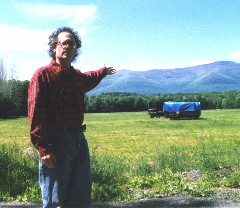
Mikhail Horowitz gestures toward a truckload of raw gumption,
discovered in a field near Woodstock, which he would later refine into
pure stage moxie at a secret home workshop.
|
Simple humility protected Mikhail Horowitz
from critical scrutiny
during his long years as entertainment editor and cultural czar for
Ulster County's leading newspapers.
It was a
clever device. How could he, in good conscience, assign (or permit)
any of his minions to review or promote any of the outrageous
performances he was skulking off into the moonlight to commit with his
cohort, Gilles Malkine? How could audiences be adequately prepared
for the briar bush wit they would be tossed into at one of the pairís
public exhibitions of social parody if not suitably cautioned by a
discerning critic of contemporary onstage behavior? How indeed?
Fortunately, circumstances changed with Horowitz's defection from
local media to assume a senior editor's position at a sports-obsessed
corporation. (It was for the bigger bucks, he now insists, and not
because he was once a large, strapping athlete, as rumor has it, who
dwindled to his current stature because of too much reading.)
Finally, with Horowitz's relinquishment of local media control, the
literate public, as well as people like yourself, can be filled in on
the sordid details of his double life.

Malkine, a moment after it is noticed that the "playlist" taped to
his guitar reads "mayonnaise, anchovies, Penthouse, duct tape, A&D
ointment, nose hair clippers, lute strings, grapes, Pepto Bismol,
curling iron, handcuffs..."
|
The first clue to former czar's out-of-office conduct involves the
impression that perhaps it is Gilles Malkine who is the actual twisted
genius behind Mikhail Horowitz's exhibitions of preposterous humor, so
our probe began with an interrogation, excuse me, interview with that
source. Gilles was born in Paris, France and had to be, as he says,
"imported, like a sardine" to Brooklyn when he was two months of age.
Since his grandmother had worked with Emma Goldman on the latter's
memoirs with Stella Ballantine of the Ballantine publishing clan of
Woodstock, Gilles became a Shady toddler when a family visit turned to
full-time residence about a year later.
Gilles' father, a well-known painter, fit comfortably into Woodstock's
artist community and his mother, Sonia Malkine, who became Woodstock's
First Lady of Song, taught him his first few guitar chords. Although
he claims he now owns more guitars than he knows chords, Gilles would
grow to quietly distinguish himself as a classical player. He met
folkblues artist, Tim Hardin, in the summer of 1966 when Hardin was
staying at a Woodstock cabin belonging to Peter Yarrow's mother.
After a stint in the service,
he was recruited by Hardin, first as a roadie, then as a band member
in 1968 and played the Woodstock festival with him; a gig he remembers
as a disaster.
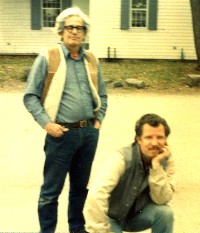
Malkine (crouching, right) during the period he teamed with legendary
banjo player Billy Faier (standing, left)
|
"The Friday night set was awful," Gilles recalls. "You couldn't see
the end of the audience. It was like all humanity was looking at you,
so we were a bit discombobulated to begin with...Then Tim decided to
start off with a song that hadn't been written yet. He was very
enthusiastic about his music, with good reason, but it didn't work.
We finally got on track but there were internal problems with the
band. It was pretty intense, being with Tim."
The following night they played a concert at Flushing Meadow Park with
Odetta, Bill Keith and others that Malkine remembers as the finest set
he ever played with Hardin, including a Carnegie Hall appearance, but
it was also to be the last.
"It was back-to-back, the worst and the best sets and the next day I
quit. It was too much for me," Malkine explains. "I had been
suddenly thrown into the music business, which I think is just as bad
as the boxing business; full of low-lifes, egos, money, crooks,
druggies- or, if they're not druggies, they take advantage of
druggies...and they know just how..."
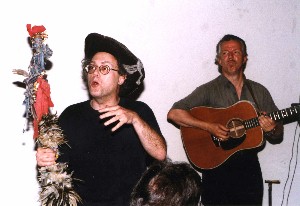
In his role as Chief Abbot of the Swamp Editors Eviration Society,
Horowitz hoodoos hapless scribes with a random spell for permanent
writer's block as Malkine ponders the proper chords for a banshee
screech.
|
Malkine concedes that it had its good points and he met some
"wonderful people, like Howard Solomon of the Cafe AuGoGo, Richie
Havens and others" but, all-in-all, he didn't want to be in the
business. As he says this, there is about Malkine, an unmistakable
air of dignity and refined self-possession. He has often stated that
he'd just as soon just play at home and record. So, how, we might
wonder, did Horowitz seduce him into not only taking part in such open
displays of social ridicule and raw irony but, also, into posing in a
hippie wig for the cover of their first tape release, So What Do You
Want For Ten Bucks?
"Of course, I would never do such a thing without being blackmailed,"
Malkine responds in a blink. "He's got all the dirt on me and
everything I do up there, I'm forced to do against my will...But, as
bad as being associated with him as an entertainer
may be, it's not nearly as bad as eating with him in a public restaurant."
But, how, we must ask, did this captivity begin? When did they meet?
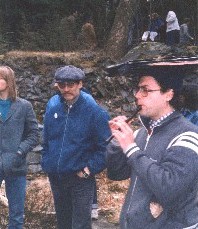
Horowitz (foreground, right, with Cambodian take-out lunch in pocket)
pipes to the absence of Pot and Pan
at a poetry reading in the '90s.
|
"I hadn't met him, but I was aware of Mik through reading his movie
reviews in the Sunday Freeman," reflected Malkine. "I always looked
forward to them. It was just great writing; always refreshing,
humorous, insightful, smart. He must have had
someone helping him."
Gilles' sister, Fern, contacted Horowitz before a retrospective
exhibition of their father's painting in 1989 and Gilles was impressed
by the preview Mikhail typed out in longhand; "I could see right away
that he was a conscientious, good person with his feet on the ground.
Little did I suspect that his feet were not connected to his mind."
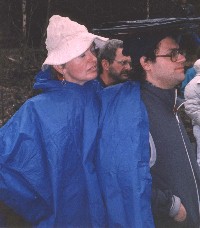
Wet Poets Society members Janine Pommy Vega and Mikhail Horowitz
witness the outdoor open microphone electrocution of a novice
colleague in Birkenstocks.
|
Shortly thereafter Gilles heard that Horowitz was laid up with a
painful pulmonary infection and called to cheer him up by reading him
the opening section of Mark Twain's 1601, wherein the author expresses
his distain for Elizabethan pretensions
with a courtly discourse on flatulation. He remembers hearing a
continual stream of peculiar noises over the phone as he progressed
but he disregarded them and kept reading. Only later, Malkine reveals
with only the slightest trace of satisfaction, did
Horowitz tell him that the laughter he provoked on that occasion had
caused the pinnacle of agony from his chest-restricted condition. They
would soon create a comedy bit based on the piece used in their first
performance together on April Fool's Day,
1989, at the Woodstock Guild.
It was at this point that Malkine began to learn of his
partner-to-be's background as crazed poet and incorrigible stand-up
wit. There had been no mystery concerning Horowitz's regional
origins. Even with the quick and often eloquent turn of tongue he
displays, anyone who listens the pair's brilliant new CD,
Live, Jive & Over 45,
can discern by the two syllables Mikhail wrings out of the
word "long" in the phrase "long hours" that he is a Brooklyn native
heavily influenced by Long-ga Island. But, now, Giles discovered that
Mik had stuck to the vicinity, after attending SUNY New Paltz in the
1970s, as half of a completely irreverent act called Null & Void.
(Which half is still open to question). They took such utterly
offensive delight in freedom of expression that they once had to be
smuggled out of an Elk's Convention their mischievous manager had
booked them into "in Wheezer, Idaho," by the two strippers they opened
for, after dodging a hail of debris on stage.
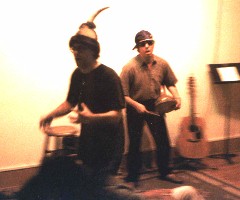
Debuting a long overdue hip-hop version of Beowulf.
|
Rather than ponder whether the Elks of Idaho brought their own ears of
corn to throw (and there IS a WEISER, Idaho on the map, so the
accuracy of the story can be seen as ominous), Malkine reflects that
"Mik's sense of humor has matured at least a quarter of an inch since
then and now we're more into ideas than effect, so if we come across a
Wheezer crowd, it'll take them longer to figure out he's being
offensive and give us a head start."
Actually, when you analyze their performances, whether they're
lampooning the state of national health care with a blues called
"St.James Wellness Facility"; spoofing ethnic elan with "Ghost Rabbis
In the Sky"; converting William Blake's poetry to doo-wop or mangling
Beckett's "Godot" in a rap version, you're forced to recognize the
element which gives wings to these notions. They're all hip. And
that is the secret of how Horowitz was able to function as both a
literary wildman and editor of a family newspaper.
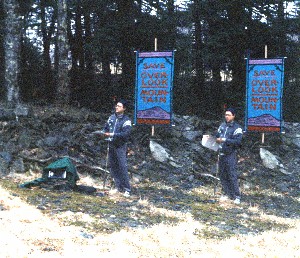
Horowitz (foreground, left and right) employs skeptically redundant
logic to brilliantly debunk the alleged doppelganger experience
reported in Goethe's autobiography.
|
In 1958, a crafty humorist now living near Kansas City, Del Close,
issued a classic "learn a language" album called How To Speak Hip.
One of the criterion of hipness is sophistication, as defined by
Close, in a highly developed sense of what is APPROPRIATE and that,
Malkine observes, is gravity center in Horowitz's galaxy as their act
adjusts on the spot to the character of their audience. Heavily
influenced by the Beat movement and other countercultural
considerations, Horowitz can fly on courses charted by the divine
comedic poet of the Ď50s, Lord Buckley, who once led a troupe of 40
nude people through the lobby of the Royal Hawaiian Hotel. This is,
perhaps, not high on Mik's list of things-to-do but he sure can tell
you WHY it should be done. Meanwhile, he tempers his Lenny Bruce
laser with circumspect, but no less hilarious, shades of Bob Newhart.
"When I first meet Mikhail, I was told that you could not talk to him
for two weeks prior to a show," Malkine confides. "He memorizes an
incredible amount of very dense material and he's tied up in a knot in
every sense of the word, although he doesn't like me to talk about his
sex life, so tight you couldn't be around him. But, now, there's a
complete turnabout. Before, every 't' had to be crossed- a false fear
because he always lands on his feet off the improv tightrope- but now
it's 'Here's the list. We'll do what comes up' and he's giggling
before we go on and asking 'Can you believe that we, grown men, are
about to do this act?' What a great way to prolong adolescence! We've
thought about 'Grown Men' as billing. Or, maybe, Malkine and Mikhail
but you probably shouldn't mention that to Mik just yet."

Gilles Malkine, surveying potential sites for Woodstock's downtown
six-story parking garage.
|
Malkine, who still shudders over a lapse on live television, going
totally blank in the middle of a classical guitar piece, has done some
small theater acting and is remarkably at ease with the pitfalls of
comedic timing and improvisation. "My instrument is myself, my brain,
my mouth," he quips quickly, before anyone can ask "Well, if you're
timing is so good, why weren't you born during the heyday of
vaudeville?' Instead, they find themselves active in the era of the
Rosendale Cafe
and you can find them there as well. (Mikhail
Horowitz's astonishing thought-songs are available on his The Blues of
the Birth cd for the Euphoria jazz label but their work together is
not sold in stores. Agoraphobics who can't make the gig can get the
tape or cd by calling (845-657-2210). Malkine, who says their best
audience is composed of library administrators but that they welcome
anyone, thinks that the intimate atmosphere of the Cafe is ideal for
their act.
"We enjoy a literate crowd but we're goofy enough for everyone,"
Malkine smiles. "Beckett didn't know any more about Waiting For Godot
than any intelligent person who reads it. He said that in an
interview and I thought that was pretty hide-and-seek of him but Mik
likes to be right out there in the middle of his audience. I keep
telling him it's not professional to work with your back to people but
I guess he knows where his best side is..."
Gary Alexander
is an independent journalist and scholar whose focus of
interests range through a variety of disciplines. Under various names,
he has written (and ghost written) upon history and current event;
science and technology, as well as music and the arts in books and for
national periodicals. While particularly attentive to the subtle and
complex impact upon cultural imagination and contemporary structures of
presumption which activity in the above mentioned topics tend to have,
Alexander treats his topics with a slightly more than occasional resort
to humor.
Posted on June 10, 2000
|

